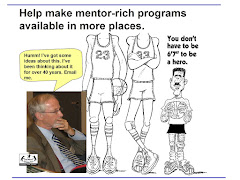When we formed the Tutor/Mentor Connection in 1993, with a goal of helping tutor/mentor programs grow in all poverty neighborhoods of Chicago, our first task was to find out who was already doing this work, and to expand our library of research showing where and why they were needed, and ways leaders could build and sustain strong programs in more places.
Over 40 years I've collected quite a bit of information. Below is a concept map that I use to show the 4-sections of the library. I put it into a Thinglink so I could point to each section and tell why I think the information is important. Take a look.

You could spend a lifetime digging through this information and still not find all that the library includes. One reason is that while I point to more than 2000 other organizations, they each point to more organizations from their sites, and they each are constantly adding new information.
Thus, think of this as a huge department store or a college library. Get to know the sections and what's included. Then dip into it on an on-going basis to build a deeper understanding of different topics and to see how resources from one section relate to resources in another. Or just search for terms or topics and see if they are there.
As you look at this, take a look at this 4-part strategy map, described in this article. The information in the web library is Part 1 of this four part strategy. Drawing more users to the library and helping them understand and apply the information to help build and sustain systems of support for kids living in high poverty areas are the other three steps.
I've been building this over 40 years and now am looking for partners to help me keep it going and draw more users to it, but also to carry this forward in future years. I created this Wiki page to show that "One of the greatest resource we offer is the library of links and ideas we host."
If you're interested in helping, connect with me on one of these social media pages or post a comment below.










No comments:
Post a Comment